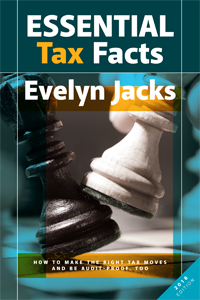Financial Pros Push for Canadian Tax Reform

It’s almost unanimous among tax and financial advisors who strongly believe that Canada needs tax reform to create a fair, simple and certain tax system for people of all income levels.
Over 91 percent of people who responded to the Knowledge Bureau’s September poll believe that things need to change, and the comments highlighted a few key issues that need to be addressed:
-
Canada’s competitiveness, and increasing the appeal for business owners to stay here rather than moving to the U.S. due to lower tax rates
-
The disconnect between the federal and provincial regulatory framework for taxation
-
Encouraging people to improve their own financial system, without discouraging them with higher taxes, or in providing a minimum annual income
-
Changes to filing dates/deadlines
-
Increased tax awareness and education for average Canadians
Here are some of the very insightful comments that industry professionals submitted:
Kris poi nted out that the heart of the issue is that our tax system is overly complex: “Taxes are complicated and benefits to the segment of our population that need support is too fragmented. We also seem to punish anyone that seeks to do better and encourage companies once they become successful to move to the States.”
nted out that the heart of the issue is that our tax system is overly complex: “Taxes are complicated and benefits to the segment of our population that need support is too fragmented. We also seem to punish anyone that seeks to do better and encourage companies once they become successful to move to the States.”
Gaétan would like to see more harmony in the tax system: “Canadian taxation must remain competitive internationally, particularly with the United States. As an exception, Quebec continues to administer the collection of its provincial taxes, which leads to a recurring cost of $400 to $600 million per year, according to experts. Quebec has no choice but to focus on the Canadian system to have a single office for the collection of taxes like the other Canadian provinces. Many fiscal experts believe that one-stop office (federal and provincial) administered by Revenue Canada appears to be more efficient than a one-stop office administered by Revenu-Quebec. In summary, the federal and provincial governments need to harmonize their regulatory framework and tax systems to achieve more efficiency in taxation.”
Sandra proposed a solution: “For the past 31 years (of my involvement in tax) there has been a discussion about simplifying taxes.
By now I have to think that simplification is a myth. Would the most fair approach be a flat tax? Sure:
-
Exempted income up to the poverty line (or basic income, which should happen)
-
Here is all my income x 20%, no exceptions
-
Sole proprietors pay 20% of their draws
-
Shareholders pay 20% of their draws
-
Capital Gains are subject to the same 20%
-
Pension Income is subject to the same 20%
-
Corporate tax continues as is
-
With basic income there is no need for CPP, OAS, EI, Welfare/Social Assistance, Rent Subsidies.”
Marcia said the solution is education: “Taxes are confusing and frightening to many people. Everyone needs a basic understanding of this subject, because nobody escapes it. If people could grasp the basics, they could make responsible decisions during the year to minimize their tax liability, and then work with experts to refine their planning.”
And David agreed: “Actually, I think more important than simplification, is the awareness factor. Taxes should be taught in high school. One simple module of about 6-8 hours ought to do it—make it part of a math class or careers or social studies/civics, etc.”
Finally, Stefanie encouraged professionals not to give up – and to continue to push the government for needed change: “This is of particular importance to business owners, professionals and high-net-worth individuals.
“We have seen recent tax reforms targeting these specific demographics. Fortunately, some of the proposed changes were not implemented. The dedicated industry professionals that put in submissions during the consultation period provided insight into implications both to our economy and to our communities. Given all of the challenges that exist for business owners in Canada (e.g., NAFTA, FOREX, TOSI, etc.), it is important that we continue to share our expertise with our government leaders so they can make informed decisions when designing reforms or putting policy in place.”
The issue of financial literacy among Canadians is one that needs to be addressed further, and advisors play an important role in this. Which is why for October’s poll question we are asking: “In discussing year-end investments with clients, do you believe Canadians understand their capacity for risk taking?” Weigh in with your comments!
Additional educational resources: Help your clients improve their financial literacy on tax issues that hit close to home. Gift them with their own copy of Essential Tax Facts: How to Make the Right Tax Moves and be Audit-Proof, Too by Evelyn Jacks.
COPYRIGHT OWNED BY KNOWLEDGE BUREAU INC., 2018.
UNAUTHORIZED REPRODUCTION, IN WHOLE OR IN PART, IS PROHIBITED.
 |
 |
 |
 |
|
Refer a Friend |
Research |
Calculators |
Course Trials |
 |
 |
 |
 |